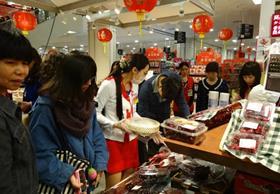
The multi-million dollar losses facing Chilean cherry exporters caught up in the coronavirus outbreak cruelly expose the danger of being over-reliant on a single market. But the fallout from a global pandemic would have serious repercussions for the whole of Latin America.
With health officials in the US and several European countries now bracing for a significant expansion of the disease, countries like Peru, Chile and Colombia who have been ramping up production in recent years and rely heavily on exports, are braced for a bumpy ride.
Up to now, the Peruvian government has sought to play down the impact of the coronavirus. Official statements have insisted that there was no indication that fruit exports have been affected.
With the grape season already winding down when the shutdown occurred, avocados and mangoes are the main products in the frame. But in both cases, China takes a small fraction of Peru’s overall export volume.
The Ministry of Agriculture and Irrigation said no mango and avocado exports to China had been caught up in the outbreak. It points out that 15 Chinese ports remain open and receiving shipments from various countries, including Peru.
However, the president of the Association of Farmers of Casma (Ancash-Peru), Rafael Santolalla Coral told national reporters that the outbreak had paralysed mango exports to China, generating a considerable loss for the region’s producers.
According to Santolalla, Casma was planning to export around 10,000 tonnes to China by air and sea, a similar volume to last year.
Erik Fischer, president of exporter association Adex, also stated that shipments of mango and grapes were being diverted to Europe because of the situation in China, but said the true impact of the crisis on trade would not be known until March or April.
Fruitnet also understands that some shipments at the tail end of the grape season have been cancelled or diverted to other markets.
“In our case, the season was almost over and most of our grapes had either arrived [in China] or had already been dispatched,” Arturo Hoffmann of Peruvian table grape exporter Agrícola Don Ricardo told Fruitnet on Monday.
“We analysed the situation in detail with our Chinese customers and decided to continue with these, as diverting cargo that is already on the water is logistically very complicated.
“But we did cancel the few remaining shipments we had planned for China in the last two weeks of the campaign and redirected the fruit to closer markets, such as the US.”
Fischer urged companies to seek to identify possible alternative markets, as well as opportunities to take advantage of the gaps left by China in other markets.
Chile takes pricing hit
Meanwhile, the latest trade figures to be released in Chile show that the value of fruit exports fell by 23 per cent in January as cherry prices slumped in the wake of the government shutdown after Chinese New Year. Shipment volumes remained virtually stable compared to the year-earlier period at 281,000 tonnes.
Asoex estimated last month that export earnings in the current campaign fruit could fall by US$100m as a result of the outbreak.
Colombian eyes on Europe
As the newest player in China – the first shipments were carried out at the end of 2019 – Colombia’s avocado industry has yet to make its mark in the country and exporters are looking at a lost opportunity rather than financial losses.
Nevertheless, they are keenly following the global development of the disease. Mauricio López of new Colombian avocado grower-exporter Green Superfood, told Fruitnet that if the arrival of coranovirus in Europe were to affect the flow of exports, this would “have a considerable impact for the national economy”.
“If the crisis were to spread this would be very serious for Colombia, taking into account the growth in our production and low domestic demand,” López noted. “The industry would face a bottleneck in its exports which would have a significant impact on all producers and exporters in the country.”
Ecuador banana exports dip
Ecuadorean banana exports to China fell by 6 per cent in January compared to the year-earlier period. Richard Salazar of Acorbanec said the decline was partly down to the temporary stoppage of shipments by producers due to delays in payments from their Chinese customers as a result of the coronavirus outbreak.
Several shipments of bananas were among the hundreds of anchored ships waiting to dock in Chinese ports during the shutdown, and this, coupled with the subsequent fall in demand, suggests that the repercussions will be reflected in trading figures for March.
Last year Ecuador shipped around 79.6m 43lb boxes of bananas to East Asia, Turkey, Iraq and Italy according to Acorbanec. Some 600 containers with bananas were shipped to China each week.



